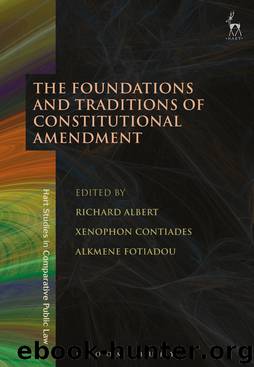The Foundations and Traditions of Constitutional Amendment by Richard Albert Xenophon Contiades Alkmene Fotiadou

Author:Richard Albert,Xenophon Contiades,Alkmene Fotiadou
Language: eng
Format: epub
Publisher: Bloomsbury UK
Published: 2017-03-15T00:00:00+00:00
III.POLITICAL CLEAVAGES AND NARRATIVES FOR CHANGE
Richard Sinnott identifies a ‘potentially powerful religious-conservative versus secular-liberal cleavage that remains politically subliminal’ underlying politics in Ireland.21 This cleavage manifested itself in constitutional referendums on divorce (1986 and 1995) and abortion (1983, 1992 and 2002) and subsequently in the 2015 marriage referendum. As political parties and interest groups coalesce around cleavages, the support of these groups for a proposal can help voters to reach a decision that reflects their interests, broadly defined.22 Lupia and Johnston argue, however, that voters can be competent without being fully informed, once they reach the same judgement as they would if fully informed.23 The Children’s Rights Referendum was presented in terms of the cleavage identified by Sinnott.24 In the years leading up to the referendum proposal, the interest groups supporting the proposal were, broadly speaking, on the secular/liberal side of the political spectrum. More starkly, most of the voices raised against the proposal were from a religious and/or conservative background. Mary O’Rourke, a leading politician who chaired the Oireachtas Committee that formulated one of the reform proposals, characterised opponents of the children’s rights referendum as ‘an extreme right-wing element in Ireland which—even though the headlines scream of the shameful abuse of children—will regard any such intrusion as being against the Constitution and contrary to the fundamental rights of the family’.25 According to this narrative for change, conservative forces wanted to maintain a constitutional preference for parental rights over children’s rights. However, this depended on a misunderstanding of the constitutional position. The Constitution, as we shall shortly see, did not grant parents rights over their children, but rather gave parents considerable authority to decide on what was in the best interests of their children and whether to assert their children’s rights. Defenders and opponents of this constitutional status quo could both legitimately claim to respect a child’s best interests and children’s rights; they differed over the appropriate level of parental authority in respect of those best interests and rights.26
Although the pre-amendment Articles 41 and 42 of the Irish Constitution contain one or two references to parental rights, the better characterisation is that they accord a high level of authority to parents in respect of children’s rights. The Family is protected ‘in its constitution and authority’. Parents have a ‘right and duty’ to provide for the education of their children. There is one explicit child’s right: the right to attend a school receiving public money without attending religious instruction. There is one explicit parents’ right: the rights of parents in the matter of religious and moral formation. However, the centrally important provision of Article 42.5 gave a residual power to the State to protect children, framed in terms of the child having rights and parents owing a duty to their children. This is fundamentally inconsistent with a parental rights model. The better reading of the Constitution is therefore that it recognised children’s rights and provided that parents were to be the authoritative decision-makers for children, but with a residual power for the State to interfere in the case of parental failure.
Download
This site does not store any files on its server. We only index and link to content provided by other sites. Please contact the content providers to delete copyright contents if any and email us, we'll remove relevant links or contents immediately.
Conversations with RBG by Jeffrey Rosen(752)
Genetics by Unknown(740)
The Tyranny of Good Intentions by Paul Craig Roberts(676)
Journalism by Michael Schudson(590)
Critical Race Theory by Richard Delgado & Jean Stefancic & Angela Harris(550)
Losing the News by Jones Alex(545)
The Permission Society by Timothy Sandefur(522)
Talking Back to the Indian Act by Mary-Ellen Kelm(519)
Active Liberty by Stephen Breyer(518)
Supreme Power by Ted Stewart(516)
American Studies by Deloria Philip J(507)
The Jury in America by Dennis Hale(503)
The Federalist papers by Alexander Hamilton; James Madison; John Jay; Lawrence Goldman(500)
Information Privacy Law by Daniel J. Solove Paul M. Schwartz(491)
A Case for the American People by Norman Eisen(485)
The Conscience of the Constitution: The Declaration of Independence and the Right to Liberty Hardcover by Timothy Sandefur(479)
We the People by Sachs Albie(469)
The Constitutional Convention by James Madison(465)
Supreme Inequality by Adam Cohen(464)
